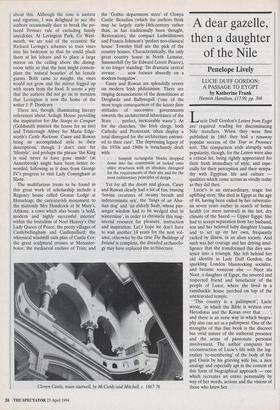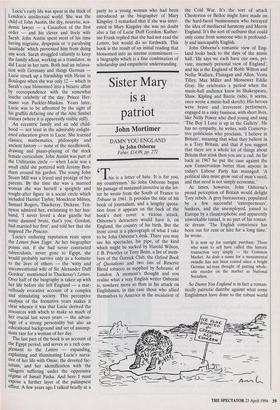A dear gazelle, then a daughter of the Nile
Penelope Lively
LUCIE DUFF GORDON: A PASSAGE TO EYGPT by Katherine Frank Hamish Hamilton, £17.99, pp. 398 Lucie Duff Gordon's Letters from Eygpt are required reading for discriminating Nile travellers. When they were first published in 1865 they had a runaway popular success of the Year in Provence sort. The comparison ends abruptly with popularity, though, for the Letters were also a critical hit, being rightly appreciated for their fresh immediacy of style, and espe- cially for their perception and their sympa- thy with Egyptian life and culture qualities which come across as vividly today as they did then.
Lucie's is an extraordinary, tragic but uplifting story. She died in Egypt at the age of 48, having been exiled by her tuberculo- sis seven years earlier in search of better health (or mere survival) in the hot, dry climate of the Saeed — Upper Egypt. She had to accept separation from her husband, son and her beloved baby daughter Urania and to set up on her own, frequently racked by illness, in an alien society. And such was her courage and her driving intel- ligence that she transformed this dire sen- tence into a triumph. She left behind her old identity as Lady Duff Gordon, the sparkling London bluestocking socialite, and became someone else — Noor ala Noor, a daughter of Egypt, the revered and respected friend and benefactor of the people of Luxor, where she lived in a ramshackle house perched on top of the unexcavated temple.
`This country is a palimpsest', Lucie wrote, 'in which the Bible is written over Herodotus and the Koran over that . . . ', and there is an eerie way in which biogra- phy also can act as a palimpsest. One of the strengths of this fine book is the discreet but vivid nature of the authorial presence and the sense of passionate personal involvement. The author compares her reconstruction of Lucie's life with the leg- endary 're-membering' of the body of the god Osiris by his grieving wife Isis, a nice analogy and especially apt in the context of this form of biographical approach — one which recreates an entire personality by way of her words, actions and the visions of those who knew her. Lucie's early life was spent in the thick of London's intellectual world. She was the child of John Austin, the dry, neurotic, aca- demic lawyer — a Casaubon of the first order — and his clever and lively wife Sarah. John Austin spent most of his time having migraine, dyspepsia or 'a paralysing lassitude' which prevented him from doing any work. Sarah struggled valiantly to keep the family afloat, working as a translator, as did Lucie in her turn. Both had an infatua- tion with Germany and things German Lucie struck up a friendship with Heine in Boulogne when she was only 12 — which in Sarah's case blossomed into a bizarre affair by correspondence with the somewhat louche celebrity of the day, Prince Her- mann von Puckler-Muskau. Years later, Lucie was to be affronted by the sight of his graffiti defacing one of the Abu Simbel statues (where it is apparently visible still).
An eccentric family and an odd child- hood — not least in the admirably enlight- ened education given to Lucie. She learned classics, mathematics, philosophy and ancient history — none of the needlework, drawing and piano-playing of the stock female curriculum. John Austin was part of the Utilitarian circle — when Lucie was a small child she pottered with Jeremy Ben- tham around his garden. The young John Stuart Mill was a friend and protégé of her parents. By the time she was a married woman she was herself a sprightly and sought-after figure in a social circle which included Harriet Taylor, Monckton Milnes, Samuel Rogers, Thackeray, Dickens. Ten- nyson admired her, exclaiming to her hus- band, 'I never loved a dear gazelle but some damned brute, that's you, Gordon, had married her first', and told her that she inspired The Princess.
Lucie's enduring reputation rests upon the Letters from Eygpt. As her biographer Points out, if she had never contracted tuberculosis, never gone to Egypt, she would probably survive only as a footnote to the lives of others — the 'witty and unconventional wife of Sir Alexander Duff Gordon', mentioned in Thackeray's Letters. Over half of the biography is taken up with her life before she left England — a mar- vellously evocative account of a complex and stimulating society. This perceptive analysis of the formative years makes it clear whence it was that Lucie derived the resources with which to make so much of her crucial last seven years — the advan- tage of a strong personality but also an educational background and set of assump- tions rare for a woman of her day.
The last part of the book is an account of the Egypt period, and serves as a rich com- plement to the Letters — expanding, explaining and illuminating Lucie's narra- tive of her life with Omar, the devoted fac- totum, and her identification with the villagers suffering under the oppressive regime of Ismail Pasha. And here I must expose a further layer of the palimpsest effect. A few years ago I talked briefly at a party to a young woman who had been introduced as the biographer of Mary Kingsley. I remarked that if she was inter- ested in Mary Kingsley she was no doubt also a fan of Lucie Duff Gordon. Kather- ine Frank replied that she had not read the Letters, but would do so forthwith. This book is the result of an initial reading that blossomed into an intense commitment a biography which is a fine combination of scholarship and empathetic understanding.



























































 Previous page
Previous page